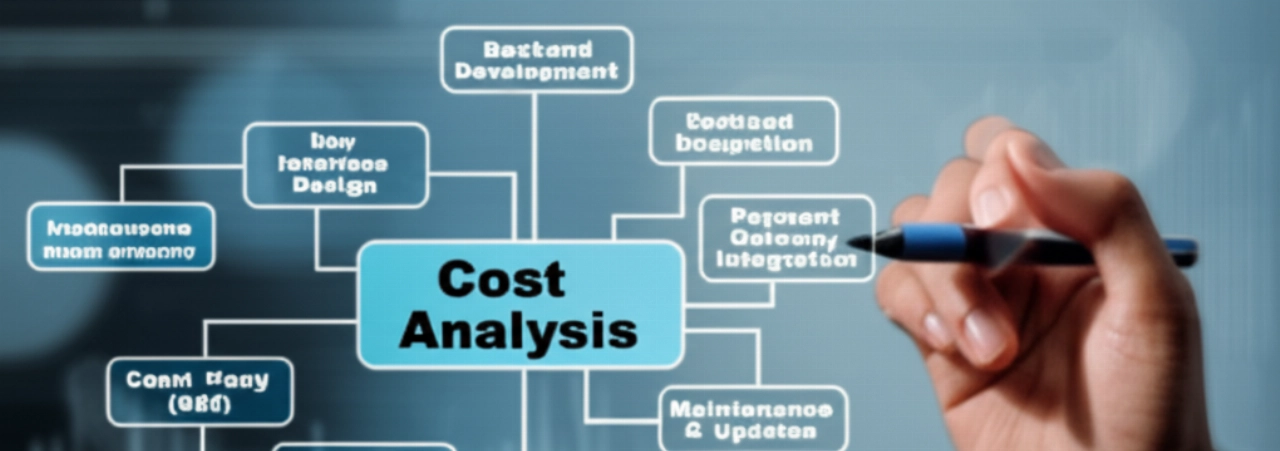Is your current e-commerce platform holding you back? Do you feel the looming dread of a scalability ceiling, knowing your unique business processes are being shoehorned into a generic system? You’re not alone. Many enterprise leaders face the nightmare of integration hell, manual workflows, and the constant anxiety that their digital commerce engine simply isn't built for the future.
The truth is, in today's hyper-competitive B2B landscape, a standard e-commerce site is no longer enough. It’s a commodity. What you need is a strategic asset, a digital fortress that protects your market share and propels growth. This isn't about just building a website; it's about custom ecommerce development that engineers a competitive moat around your business – a commerce engine your competitors simply cannot replicate.
This guide will illuminate the path from technical debt and platform limitations to a powerful, bespoke digital commerce solution. We'll show you how to transform your online presence into a core business operating system, designed for unparalleled performance, integration, and long-term profitability.

Beyond the Cart: How Custom Ecommerce Development Becomes Your Strategic Business Engine
Your e-commerce platform should be more than a transaction portal. It should be the central nervous system of your entire commercial operation, a strategic tool that drives market share and profitability. For mid-market to enterprise companies, off-the-shelf solutions often fail to capture the nuances of complex B2B workflows, intricate pricing models, or unique product configurators.
True digital transformation in commerce means building a system that:
- Reflects Your Unique Value Proposition: From custom quoting processes to tiered pricing and account-specific catalogs, your platform should mirror your sales strategy, not constrain it.
- Integrates Seamlessly: A custom solution acts as the ultimate connector, providing robust ERP integration, synchronizing with your PIM systems, harmonizing with your CRM, and streamlining operations with your WMS. This eliminates data silos and manual reconciliation, freeing up valuable resources.
- Optimizes for Performance & Scalability: Designed from the ground up for your specific traffic patterns and transaction volumes, a custom build ensures lightning-fast load times and unwavering stability, even during peak demand. This directly impacts conversion rates and customer satisfaction.
- Future-Proofs Your Investment: Unlike rigid SaaS platforms that dictate your roadmap, a custom-engineered solution built on modern, API-first principles allows for agile adaptation to new technologies, market shifts, and evolving customer expectations. This is the essence of composable commerce.
This strategic approach to custom ecommerce development isn't just about functionality; it's about creating an agile, resilient, and highly differentiated business asset.

The 'Off-the-Shelf' Trap: Why Standard SaaS Can Strangle Enterprise Growth
The allure of a quick, seemingly affordable SaaS solution is undeniable. However, for enterprise-level operations, this often becomes the 'one-size-fits-all' trap. While adequate for simpler B2C models, these platforms quickly expose their limitations when confronted with:
- Complex B2B Workflows: Think requisition lists, approval hierarchies, credit limits, or multi-buyer accounts. Generic platforms force clunky workarounds that frustrate users and increase operational costs.
- Deep Integration Needs: Your ERP, PIM, CRM, and WMS are the backbone of your business. A standard platform's limited integration capabilities lead to fragmented data, manual errors, and a significant drain on efficiency – the very definition of integration hell.
- Performance Bottlenecks: As your product catalog grows, traffic surges, or custom features are bolted on, a non-optimized platform inevitably suffers from slow load times, impacting SEO and conversion rates. This is the dreaded performance bottleneck.
- Hidden Total Cost of Ownership (TCO): What appears cheap upfront quickly escalates with costly third-party apps, custom development workarounds, and the ongoing operational inefficiencies caused by a restrictive platform. The perceived simplicity masks a higher long-term TCO.
These limitations aren't just inconveniences; they are direct inhibitors of growth, preventing you from fully leveraging your digital channel as a competitive advantage. They create a scalability ceiling that prevents you from reaching your full market potential.

Case Study Insight: From Integration Hell to Seamless Enterprise Commerce
A global manufacturer, struggling with a legacy platform that couldn't handle their complex product configurations and B2B pricing tiers, faced significant operational bottlenecks. Their existing system required manual order processing for custom quotes, leading to delays and customer frustration. Furthermore, their ERP and PIM systems were disconnected, resulting in inconsistent data and inventory errors.
Through strategic custom ecommerce development, we engineered a bespoke solution that integrated deeply with their existing ERP and PIM. We built a custom product configurator that allowed B2B buyers to build complex products online, receive instant quotes, and place orders directly. The new platform automated their approval workflows and provided real-time inventory synchronization.
The result? A 40% reduction in manual order processing, a significant boost in customer satisfaction due to self-service capabilities, and a 25% increase in online order value within the first year. This wasn't just a website; it was a fundamental re-engineering of their sales and operational processes, turning a bottleneck into a competitive differentiator.
Engineering Your Moat: The Pillars of a High-ROI Custom Ecommerce Project
Embarking on a custom ecommerce development journey requires a clear blueprint. It's about strategic planning, not just coding. Here are the critical pillars:
- Strategic Discovery & Planning: Before a single line of code is written, a deep dive into your business processes, customer journeys, and long-term objectives is paramount. This phase defines the unique requirements that will form your competitive moat.
- Architectural Excellence (Composable & API-First): Embrace modern principles like composable commerce and MACH architecture (Microservices, API-first, Cloud-native, Headless). This ensures flexibility, scalability, and the ability to integrate best-of-breed services without replatforming every few years.
- Robust Integration Strategy: A detailed plan for seamless integration with your existing enterprise systems (ERP, PIM, CRM, WMS) is non-negotiable. This is where operational efficiency is truly unlocked, eliminating data silos and manual work.
- Performance & Scalability by Design: From infrastructure choices to code optimization, every decision must prioritize speed and the ability to handle future growth. This prevents the dreaded performance bottleneck and ensures your platform can scale with your success.
- Security & Compliance: Especially crucial for B2B, ensuring robust data security, user authentication, and compliance with industry regulations protects your business and builds customer trust.
- Long-Term Partnership & Support: A custom solution is an evolving asset. Choose a partner committed to ongoing optimization, maintenance, and strategic guidance to ensure your platform continues to deliver maximum ROI.
These pillars ensure your investment in custom ecommerce development yields a powerful, future-proof asset, not just a temporary fix.
The Commerce K Difference: Your Partner in Building an Unstoppable Commerce Engine
At Commerce K, we understand that custom ecommerce development for the enterprise is not a project; it's a strategic partnership. We don't just execute; we consult, strategize, and engineer solutions that solve your deepest pain points and unlock unprecedented growth.
Our approach is rooted in de-risking your investment. We mitigate the fear of a failed migration by employing meticulous planning, phased rollouts, and rigorous testing. We eliminate the one-size-fits-all trap by designing systems precisely tailored to your unique business logic and customer needs. We tackle integration hell by building robust, API-driven connections that create a single source of truth across your enterprise.
We are not just developers; we are architects of digital commerce, dedicated to building the scalable, high-performance, and deeply integrated platforms that define market leaders. Our expertise in complex B2B ecommerce solutions ensures that your custom engine isn't just functional, but truly transformative.
Frequently Asked Questions about Custom Ecommerce Development
What is the typical ROI for custom ecommerce development compared to SaaS?
While initial investment in custom development can be higher, the long-term ROI is often significantly greater. Custom solutions eliminate ongoing subscription fees for features you don't use, reduce the need for costly third-party apps, and provide unparalleled operational efficiencies. The ability to perfectly align the platform with your unique business processes, capture new market opportunities, and achieve superior performance often leads to a lower Total Cost of Ownership (TCO) and a faster return on investment over a 3-5 year horizon compared to the accumulating costs and limitations of SaaS.
How do you manage complex integrations with existing ERP, PIM, and CRM systems?
Our approach is API-first and highly structured. We begin with a comprehensive discovery phase to map your existing system architecture and data flows. We then design robust, secure APIs and middleware layers to ensure seamless, real-time data synchronization between your custom e-commerce platform and your ERP, PIM, CRM, and WMS. Our expertise minimizes disruption and ensures data integrity, transforming integration hell into a streamlined, automated ecosystem.
What are the typical timelines for a custom ecommerce development project?
Timelines vary significantly based on complexity, required integrations, and custom functionalities. A typical enterprise-level custom ecommerce development project can range from 6 to 18 months, often delivered in agile phases. Our detailed scoping and strategy sessions provide a clear roadmap and realistic timeline projections, ensuring transparency and predictable delivery.
How do you ensure SEO continuity during a platform migration or new custom build?
SEO continuity is paramount. Our process includes meticulous SEO auditing of your existing site, comprehensive URL mapping and 301 redirects, content migration strategies, and technical SEO best practices implemented from day one. We work closely with your marketing teams to safeguard your search rankings and ensure a smooth transition, mitigating the fear of a failed migration and preserving your organic traffic.
Do we need a large internal IT team to manage a custom platform?
While some internal technical oversight is beneficial, a well-architected custom platform, especially one built on composable commerce principles, is designed for maintainability. Commerce K provides comprehensive training, documentation, and ongoing support and maintenance services. This means you can leverage our expertise for complex tasks while your internal team focuses on strategic initiatives, avoiding the need for a massive internal IT expansion.
Ready to Engineer Your Unstoppable Commerce Engine?
Stop navigating technical debt and the limitations of generic platforms. Your business deserves a clear digital commerce roadmap that delivers measurable results and builds an unassailable competitive moat. The first step isn't a quote; it's a no-obligation Scoping & Strategy Session with our senior architects.
We'll help you map your potential, de-risk your investment, and uncover the opportunities you're currently missing in your digital commerce strategy. Don't let the scalability ceiling or integration hell define your future. Start building your future-proof commerce engine today.
Click here, tell us about your project, and discover the strategic advantage of true custom ecommerce development.
Further Reading:





